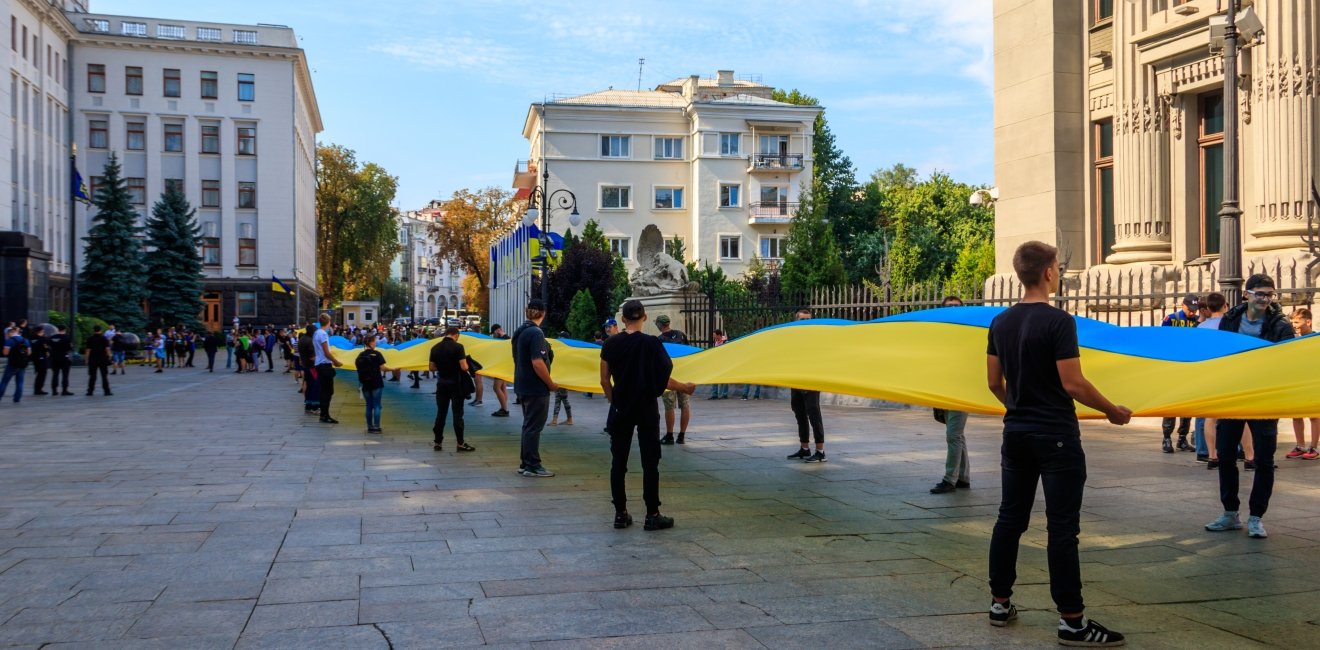
A blog of the Kennan Institute
BY NATALIA KUDRIAVTSEVA
On May 19, 2021, the Ukrainian government approved an action plan for the promotion of the Ukrainian language in all spheres of public life for the period 2022–2030. The plan was developed by the Ministry of Culture and Information Policy with the aim of fostering a full-fledged voluntary switch to Ukrainian that would have a lasting effect. Ukraine’s Minister of Culture Oleksandr Tkachenko called the program a “gentle Ukrainianization” and described its main features in his Telegram blog.
The program is in line with the 2019 Law on Language, passed in the last days of the previous president’s term and initially criticized by then president-elect Volodymyr Zelensky, who frequently spoke in Russian during his presidential campaign. The plan, however, restates the underlying principles of the 2019 law and highlights the role of Ukrainian as an identity marker for the nation. It emphasizes the importance of prioritizing the Ukrainian language as a means to strengthen national security in a time of persistent Russian aggression and occupation of parts of Ukraine. The concrete steps the action plan proposes are modeled on the basic provisions of the 2019 Law on Language.
The “gentle Ukrainianization” plan ensures adherence to the law’s norm regarding the obligatory use of Ukrainian by state officials and civil servants. Another point raised in the 2019 legislation and pursued by the plan is the creation of a network of offline and online Ukrainian language courses available to all free of charge. The plan also provides for a long-expected exam to test proficiency in Ukrainian, including as a foreign language. It foresees the development of a free access dictionary database, support for the Ukrainian-language film industry, to include obligatory Ukrainian-language dubbing of films and television broadcasts, and the teaching of Ukrainian as a foreign language abroad. The plan also suggests motivating Ukraine’s population to learn, be educated in, and speak Ukrainian, and to develop language-popularizing projects on their own.
Several grassroots projects designed to popularize the Ukrainian language have in fact been in place for some time. The Free Ukrainian Language Courses, a volunteer initiative promoting the use of Ukrainian among Russian speakers, were launched in 2012. Since then, the free language courses have been taken up by more than thirty cities and towns, at one time involving around 100 volunteer instructors all over Ukraine; they still afford the only opportunity to learn Ukrainian for free outside the school system. The language courses team also developed a range of Ukrainian-language materials that can be freely accessed online. The online project “Teach in Ukrainian,” established in 2020, is another volunteer initiative that aims to support Ukrainian-language instruction in non-school-based education, such as among sports circles and hobby groups. The project is meant to meet the demand for Ukrainian-medium non-school-based education by facilitating a switch to Ukrainian among existing Russian-centric circles and groups. A free online version of the most popular Ukrainian-language dictionary has been created by volunteers, as has the most complete compilation of texts written or published in the Ukrainian language, the “General Regionally Annotated Corpus of Ukrainian.” The Corpus is hosted on Germany’s Jena University website and is being expanded by its developers and by volunteer university students from all over Ukraine.
The gentle Ukrainianization agenda is consistent with other innovations in the sphere of education, where Ukrainian has been mandated to be the main language of instruction in all of Ukraine’s public schools. The recently announced action plan is also in line with the introduction of Ukrainian as the default language of public service, which came into force on January 16, 2021, as stipulated by the 2019 Law on Language. The latest developments, however, show some hesitation in meeting the other provisions of the law.
Deferrals in Parliament
On May 24, 2021, the Ukrainian parliament registered bill 5554, which suggests postponing the law’s requirement for obligatory Ukrainian-language dubbing on television, set to take effect July 16, 2021. The explanation for the proposed deferral delay was given by one of the bill initiators, Mykyta Poturaiev, an MP from the Servant of the People party and former head of StarLightMedia group, who identified the COVID-19 pandemic as the main factor standing in the way of the Ukrainian TV industry adopting the provisions of the law. Another bill, 5554-1, was registered on May 28, 2021. It too suggests postponing the date of the required implementation of Ukrainian-language dubbing along with another norm stipulating Ukrainian as the main language of public events. Minister of Culture Tkachenko, author of the gentle Ukrainianization campaign, has supported a rescheduling of the implementation date.
The draft legislation was first considered for parliament’s voting agenda on June 1, 2021, but didn’t gain the necessary number of votes. The second attempt, on June 15, was successful: consideration of the bills was supported by a simple majority of 227 votes, including those of five MPs from the parliamentary faction Holos (Voice), who subsequently withdrew their votes on the ground of technical irregularities in the manner in which the two bills were introduced, and expressed firm support for the 2019 Law on Language. The voting drew an objection from the Commissioner for the Defense of the State Language, who conducted a survey of the languages used by Ukraine’s five major TV channels. The survey revealed that only one-third of the broadcasted series are produced in Ukrainian, with the rest dubbed in Russian instead. The next day the draft legislation was announced to have been “mistakenly” included on parliament’s voting agenda. This means the two bills will not yet be considered for voting.
The other provisions of the 2019 Law on Language that are to take effect this summer concern obligatory language exams for civil servants and persons who seek Ukrainian citizenship, and the 50 percent minimum of Ukrainian-language book titles published each year. With the legislation on minority languages pending, the language battle is, as ever, between Ukrainian and its major competitor, Russian. And while top-down Ukrainianization may still be undecided, the grassroots initiatives show that is the direction Ukraine is headed in.
The opinions expressed in this article are those solely of the authors and do not reflect the views of the Kennan Institute.
Author

Associate Professor, Kherson National Technical University

Kennan Institute
After more than 50 years as a vital part of the Wilson Center legacy, the Kennan Institute has become an independent think tank. You can find the current website for the Kennan Institute at kennaninstitute.org. Please look for future announcements about partnership activities between the Wilson Center and the Kennan Institute at Wilson Center Press Room. The Kennan Institute is the premier US center for advanced research on Eurasia and the oldest and largest regional program at the Woodrow Wilson International Center for Scholars. The Kennan Institute is committed to improving American understanding of Russia, Ukraine, Central Asia, the South Caucasus, and the surrounding region through research and exchange. Read more

Explore More in Focus Ukraine
Browse Focus Ukraine
Talking to the Dead to Heal the Living

Ukrainian Issue in Polish Elections


